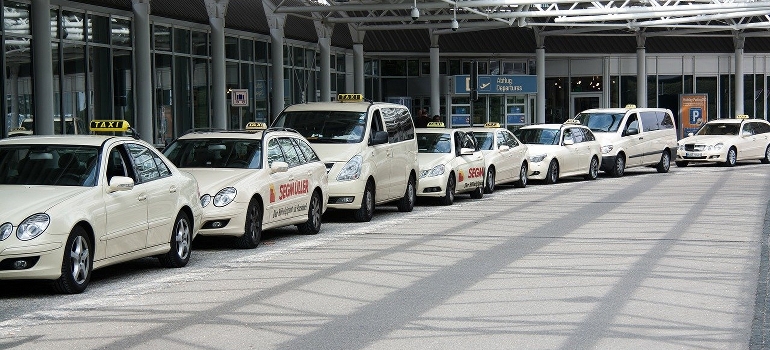Budgeting Tips for International Moving
Planning an international move is thrilling—new cultures to explore, new places to call home, and new adventures around every corner. But as exciting as it is, the price tag can quickly feel overwhelming. Between shipping belongings across continents, visa applications, plane tickets, and setting up life in a new place, the costs can pile up before you even realize it. The good news? In this Hansen Bros. Moving & Storage guide, you’ll find practical, clever cost-cutting tricks, and a few professional secrets that make all the difference. You’ll learn where your money goes, how to stay on track, and how to stretch your budget without sacrificing peace of mind. Budgeting tips for international moving do not imply pinching every penny or sacrificing comfort. It means making informed choices that support your goals and help you make the most of your money.
Know Your Costs Before You Go
Clear insight into your upcoming expenses is the cornerstone of successful budgeting. International moves include a wide range of costs, and having a complete view from the beginning makes all the difference. You may underestimate how many services and steps are involved until the bills start rolling in.
Start with the big-ticket items: shipping your belongings, transportation to your new home, visa and immigration fees, temporary lodging, and storage if needed. Add in expenses such as packing materials, customs fees, and moving insurance. You’ll also want to think ahead to settling-in costs like internet setup, local transport, and buying essentials that can’t be brought with you.
Customs duties, for example, vary wildly between countries, and some places impose taxes on household goods. Temporary accommodation during the gap between leaving and arriving can also stretch your budget if not accounted for early.
Getting quotes from several international shipping companies in Seattle helps give you a clear sense of the market rate for shipping and packing. Many professional moving services offer free consultations to outline your options and estimate costs—an excellent starting point for building a realistic budget.

Create a Customized Moving Budget
Tailoring a budget to your unique situation is far more effective than using a generic template. Every international move comes with its own timeline, priorities, and logistics. If you create a customized plan, you’ll know where your money is going and how much flexibility you have. Begin by dividing your moving journey into phases: pre-departure, in transit, and post-arrival. Within each phase, list the relevant expenses:
- In the pre-departure stage, you might include visa processing, health checks, packing supplies, and deposit refunds.
- The in-transit phase could cover shipping costs, travel expenses, temporary accommodations, and meals.
- The post-arrival section includes transportation, utility setup, legal registrations, and furnishing your new home.
Many find digital budgeting apps or spreadsheets helpful in organizing this data. Seeing it laid out makes it easier to adjust when new expenses pop up or when you find ways to save. International movers in Seattle can also help refine your budget by providing detailed, itemized quotes. That way, you’re not guessing—you’re working with real numbers and making informed choices.
Timing Is Everything (And It Can Save You Money)
When it comes to moving internationally, the calendar isn’t just about planning—it’s a powerful budgeting tool. The time of year, month, or even week can influence how much you’ll pay for services like flights, shipping, and lodging.
Peak moving seasons, especially during the summer and early fall, often bring inflated prices due to high demand. Choosing to move during off-peak months can result in significant savings. The same goes for airfares—booking well in advance or being flexible with travel dates can unlock lower prices.
Professional moving companies offer budgeting tips for international moving and frequently offer reduced rates during slower seasons. Early bookings tend to come with added discounts or perks. Giving yourself plenty of lead time also allows for strategic planning, which often saves more than rushing decisions at the last minute.
Even small shifts in scheduling—like flying mid-week instead of on a weekend—can shave costs off your overall budget. A flexible timeline gives you leverage, and that leverage often translates to real savings.

Strategic Downsizing: Save More by Shipping Less
One of the smartest ways to shrink your moving bill is to shrink what you’re shipping. Every box, bag, and piece of furniture adds weight, volume, and cost to your move. Streamlining your belongings before you go is a direct route to savings.
Items that no longer serve you, duplicate possessions, or things not suitable for your new environment should go. Sell valuable items locally through online marketplaces or host a garage sale. Donating gently used goods also lightens your load and benefits others in need. Storage is another option for belongings you plan to use later but don’t need abroad. In many cases, the cost of long-term storage at home is far less than international shipping.
Speaking with international shipping companies in Seattle can help you make smart choices here. Many movers offer volume-based pricing and can advise on what’s worth taking versus what’s better left behind. They’ll help you compare costs, estimate volumes, and even offer shared shipping options, which can drastically lower your overall expense.
Budget-Friendly Hacks
Stretching your budget doesn’t require extreme frugality—just smart strategies that make every dollar (or euro, pound, or yen) go further. While many guides offer generic money-saving tips, you need tactics tailored to international moving. A few clever budgeting tips for international moving at the right time can significantly reduce your costs while making the experience smoother.
Money-saving Tips That Actually Work
You’ve already cut costs by downsizing and choosing the right time to move. Now let’s explore practical, lesser-known ways to save that people often overlook during the hustle of relocation:
- Compare international shipping quotes thoroughly. Don’t settle for the first estimate. Request detailed quotes from at least three reputable moving companies and ask for a breakdown of each service included.
- Choose sea freight over air freight when possible. Air shipping is faster but significantly more expensive. If your items aren’t time-sensitive, sea freight is the budget-friendly route.
- Book flights and accommodations early. Prices rise as travel dates approach. Early bookings give you access to deals and flexible options.
- Use travel points or credit card rewards. Flights and hotel stays can sometimes be covered or discounted using points, giving your wallet a break.
- Opt for groupage shipping. Some moving companies allow you to share container space with other clients headed to the same region, significantly lowering shipping rates.
- Cancel or transfer subscriptions early. Streaming services, gym memberships, and utilities can charge penalty fees if you don’t give proper notice.
- Join local buy/sell groups. Once you arrive, local expats or community groups can help you buy secondhand essentials cheaply or even for free.
Taking these steps may feel small, but they add up fast. Furthermore, quality shipping crates in Seattle are a smart budgeting tool—protecting your belongings during transit and helping you avoid costly damage, so your moving budget goes further than expected.

Avoid Common Budgeting Mistakes
Even with the best intentions, it’s easy to make budget blunders during an international move. Awareness of the most frequent pitfalls helps you stay ahead of them and keeps your finances intact throughout the journey.
Underestimating costs is a big one. Customs fees, taxes, or handling charges often don’t show up on initial shipping quotes, yet they can add hundreds of dollars to your final bill. Research import regulations in your new country and double-check them with your moving provider to avoid surprises.
Another common issue is failing to insure your belongings. Damage or loss in transit isn’t rare, especially over long distances. Skipping insurance might save you upfront, but it could cost you far more if something valuable goes missing or arrives broken. Many reputable moving companies offer insurance options that are both affordable and tailored to your shipment’s value.
Last-minute decisions also tend to sabotage your budget. Booking travel or moving services too close to your departure often leads to inflated rates. Planning early, getting quotes, and locking in rates ahead of time preserves your budget and your peace of mind.
Trusting your move to an experienced international mover can protect you from these common pitfalls. Their insights, structured approach, and transparent pricing act as a safety net, keeping you informed every step of the way.
Make Room for the Unexpected
No matter how detailed your budget is, unexpected expenses can still sneak in. Delayed flights, emergency lodging, last-minute purchases, or even surprise fees at customs can put pressure on your finances when you least expect it.
Including a contingency buffer in your budget can make the difference between minor inconvenience and major stress. A good rule of thumb is to set aside 10–15% of your total moving budget for unforeseen costs. That way, when something unexpected arises—as it often does—you’re ready.
Think of this buffer as a safety parachute. If your shipment is delayed and you need an extra week in temporary housing, or if your luggage goes missing and you have to buy essentials again, you’ll have the funds to adapt quickly. This flexibility brings a sense of control during a time filled with uncertainty.
Many international movers also offer flexible service packages. Some include rebooking options, shipment tracking, and support for rerouting or adjusting your moving date. Choosing HB move management services that build in adaptability can help you manage the curveballs without blowing your budget.

Think Long-Term: Budget Beyond the Move
Most people focus their entire budget on getting to their new destination, but it’s just as important to think about life after arrival. Your initial setup costs can feel like a second move if you’re not prepared. Renting a home, buying household items, enrolling in health insurance, and dealing with local bureaucracy often require both time and money.
Start by researching the cost of living in your new city. Prices for groceries, transportation, and even mobile plans can vary dramatically. Build these into your budget so your transition feels smooth rather than stressful. If you’re moving with family, factor in school expenses, childcare, or registration fees.
Unexpected costs often arise during the first few months. You may need new appliances or end up paying deposits for utilities. Planning for this stage of the journey means you won’t be caught off guard when it matters most.
Budgeting beyond the move isn’t just about surviving the first weeks—it’s about thriving long-term. With the right preparation, you’ll settle in faster, feel more confident, and fully enjoy the new chapter you worked so hard to begin.
Your Money-Smart Passport to a New Beginning
A well-planned international move doesn’t have to empty your wallet. With the right strategies and a proactive approach, you can take charge of your budget and steer clear of financial surprises. Every decision—from when you book to what you pack—affects the final cost, and now you have the tools to make those decisions wisely. Understand your expenses, break down your budget, and embrace the value of timing.
Downsize where possible, use travel hacks that work, and leave room in your budget for the unexpected. When in doubt, lean on professionals who do this every day—they’ve already solved the problems you haven’t run into yet. Your journey abroad is a new beginning. Our budgeting tips for international moving combined with clarity and confidence ensure that it starts on the right foot—steady, supported, and full of opportunity.
Why Choose Us
History
Hansen Bros. Moving & Storage is locally owned and operated by the same family for four generations, since 1890. We have a well-established reputation for service quality and reliability with a high percentage of repeat household and commercial clients.
Professionalism
We’re a certified ProMover by the American Moving and Storage Association with A+ rating with the Better Business Bureau, voted “Best in Western Washington” in 2009 and from 2011 to 2016 by KING5. Our company is fully licensed and insured and member of WMC and AMSA.
Value
Hansen Bros. Moving & Storage provide free, no-obligation in-home estimate and competitive rates, including low minimum rates for shipments moving under 300 miles. We’ve set a refund policy for unused packing materials and three Puget Sound locations to help clients save on travel fee costs.



